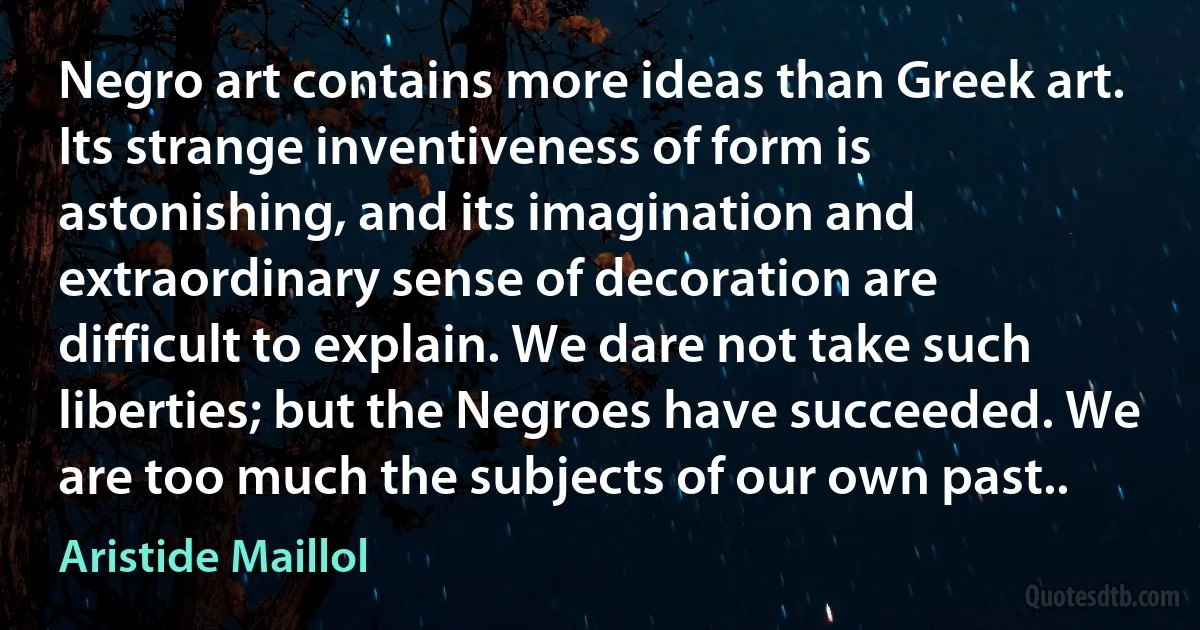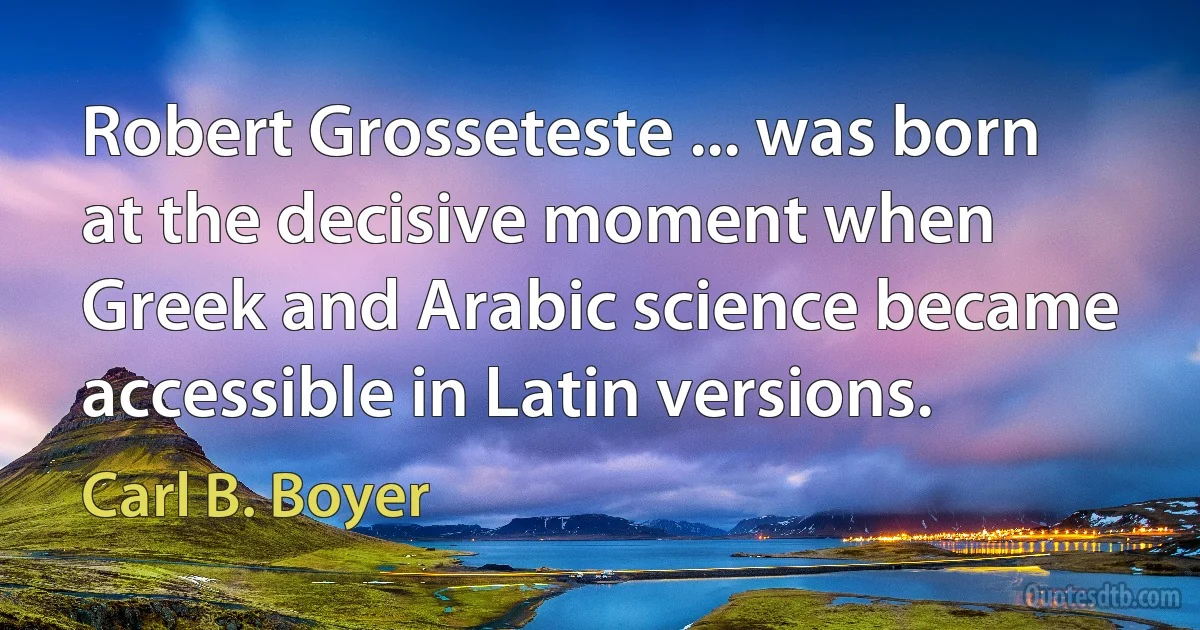Greek Quotes - page 15
The field equations, in their most general form, contain a term multiplied by a constant, which is denoted by the Greek letter λ... sometimes called the "cosmical constant." This is a name without any meaning... We have, in fact, not the slightest inkling of what its real significance is. It is put in the equations in order to give them the greatest possible degree of mathematical generality, but, so far as its mathematical function is concerned, it is entirely undetermined: it may be positive or negative, it might also be zero.

Willem de Sitter
My desire to work is not stimulated by the classical proportions of Greek architecture, but by functional silos and hangars... The confusion of places, cluttered with art and culture chokes my inspiration. What stimulates and interests me is the natural noise of a busy city, and the practical lay-out of a harbor or factory which has come into being without consideration of any aesthetic principles.

Fritz Wotruba
So there is no single European people. There is no single all-embracing community of culture and tradition among, say, Warsaw, Amsterdam, Berlin and Belgrade. In fact, there are at least four communities: the Northern Protestant, the Latin Catholic, the Greek Orthodox, and the Muslim Ottoman. There is no single language - there are more than twenty. (...) There are no real European political parties (...). And most significantly of all: unlike the United States, Europe still does not have a common story.

Geert Mak
And then the spring of [19]'48 I toddled off to Paris on a Liberty ship... Yes, and arriving in Le Havre on that Liberty ship and seeing all those-the sun was coming up-and seeing all those ships sunk.. It was hardly... I mean, war, war, war, war.... I went to Paris, and I stayed with Zuka and Louis [Mitelberg] [her husband then, the cartoonist 'Tim']. And I looked for a place-and found it on Rue Gallande. Across the river was Notre Dame. That was all of four dollars a month, with a hole on the stairs as a toilet and a spigot with cold water and one light-bulb. That was all the electricity there was. But this view, I mean, God!... Saint Julien le Pauvre [Greek Orthodox Church, oldest in Paris] was right in front of me. And so I painted there.

Joan Mitchell
The Sanscrit language, whatever be its antiquity, is of a wonderful structure; more perfect than the Greek, more copious than the Latin, and more exquisitely refined than either, yet bearing to both of them a stronger affinity, both in the roots of verbs and the forms of grammar, than could possibly have been produced by accident; so strong indeed, that no philologer could examine them all three, without believing them to have sprung from some common source, which, perhaps, no longer exists; there is a similar reason, though not quite so forcible, for supposing that both the Gothic and the Celtic, though blended with a very different idiom, had the same origin with the Sanscrit; and the old Persian might be added to the same family.

William Jones
The slave-owner is at times visited with a nightmare. He finds that his free will, in spite of its freedom, is thwarted, not by a superior will but by things-in-themselves – by inferior wills, accidents, mistakes, and his own ignorance. Yet he is still unable to conceive his will except as being thwarted like that of his slave's by another will, and since he the master is so thwarted, might not even the world's master and his – God Himself – be thwarted in his volition by some grand over-riding will, by Will-in-Itself? This is the slaveowning conception of Moira, or Fate, a comparatively late development reaching its noblest expression in Greek tragedy. This Fate, in spite of its closeness to bourgeois determinism, betrays its slave-owning parentage by the fact that it is always visualised as a consciously forseeing Will, and always as thwarting, not determining human wills as well as events, but interfering with human wills by means of events.

Christopher Caudwell
Grosseteste appears to have been the first medieval writer to recognize and deal with the two fundamental methodological problems of induction and experimental verification and falsification which arose when the Greek conception of geometrical demonstration was applied to the world of experience. He appears to have been the first to set out a systematic and coherent theory of experimental investigation and rational explanation by which the Greek geometrical method was turned into modern experimental science. As far as is known, he and his successors were the first to use and exemplify such a theory in the details of original research into concrete problems.

Alistair Cameron Crombie
Water is a polar solvent. It readily dissolves most bio molecules, which are generally charged or polar com pounds (Table 2-2); compounds that dissolve easily in water are hydrophilic (Greek, "water-loving"). In contrast, nonpolar solvents such as chloroform and benzene are poor solvents for polar biomolecules but easily dis solve those that are hydrophobic-nonpolar molecules such as lipids and waxes.

Albert L. Lehninger
Because Europe was reacting against Islam it belittled the influence of Saracens and exaggerated its dependence on its Greek and Roman heritage. So today an important task for us is to correct this false emphasis and to acknowledge fully our debt to the Arab and Islamic world.

William Montgomery Watt
Such, indeed, is the exuberance and flexibility of this language and its power of compounding words, that when it has been, so to speak, baptised and thoroughly penetrated with the spirit of Christianity, it will probably be found, next to Hebrew and Greek, the most expressive vehicle of Christian truth.

Monier Monier-Williams
While the mathematicians were still looking askance at the Greek gift of the irrational number, the Hindus of India were preparing another brain-teaser, the negative number, which they introduced about A. D. 700. The Hindus saw that when the usual, positive numbers were used to represent assets, it was helpful to have other number represent debts.

Morris Kline
The Greek prefix syn ("together with"), as in synthesis, synergy, syntropy, becomes increasingly meaningful. When things come together something new happens. In relationship there is novelty, creativity, richer complexity. Whether we are talking about chemical reactions or human societies, molecules or international treaties, there are qualities that cannot be predicted by looking at the components.

Marilyn Ferguson
There is in the rules or definitions (sutras) of Panini a remarkably subtle and penetrating account of Sanskrit grammar. The construction of sentences, compound nouns, and the like is explained through ordered rules operating on underlying structures in a manner strikingly similar in part to modes of modern theory. As might be imagined, this perceptive Indian grammatical work held great fascination for 20th-century theoretical linguists. A study of Indian logic in relation to Paninian grammar alongside AristotleAristotelian]] and Western logic in relation to Greek grammar and its successors could bring illuminating insights.

Pāṇini
The chief innovator of symbolism in algebra was François Viète... an amateur in the sense that his professional life was devoted to the law... John Wallis... says that Viète, in denoting a class of numbers by a letter, followed the custom of lawyers who discussed legal cases by using arbitrary names [for the litigants]... and later the abbreviations... and still more briefly A, B, and C. Actually, letters had been used occasionally by the Greek Diophantus and by the Hindus. However, in these cases letters were confined to designating a fixed unknown number, powers of that number, and some operations. Viète recognized that a more extensive use of letters, and, in particular, the use of letters to denote classes of numbers, would permit the development of a new kind of mathematics; this he called logistica speciosa in distinction from logistica numerosa.

Morris Kline
Panini, the ancient grammarian (probably belonged to 5th century or sixth century BC) mentions a character called Vasudeva son of Vasudeva, and also mentions Kaurava and Arjuna which testifies to Vasudeva Krishna, Arjuna and Kauravas being contemporaries. Megasthenes (350-290 BC), a Greek ethnographer and an ambassador of Seleucus I to the court of Chandragupta Maurya mentioned about Herakles in his famous work Indica.

Pāṇini
The Greek chemical treatises contain... a great amount of practical chemical information... fusion, calcination, solution, filtration, crystallization, sublimation and especially distillation; and methods of heating include the open fire, lamps, and the sand and water baths. Nearly all this practical knowledge... the Arabs... derived... from the very source we are now considering.

J. R. Partington



